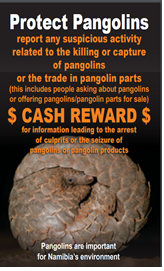
Pangolins are believed to be the most trafficked mammals in the world. The biggest demand for pangolins is in Asia, especially China. The main reason is that the scales, made of keratin like our finger nails, hair and rhino horns, are used in traditional Asian medicines and for ornaments and charms. The scales have no medicinal properties. It is an Asian myth that causes huge environmental damage and threatens the survival of these species. Pangolin meat is also sold at high prices in Asian restaurants.
Pangolins have walked the earth for 80 million years. They are insectivores and are harmless to people. They just do good for our environment. They eat ants and termites - millions and millions - as many as 70 million per pangolin per year. That’s about 191,780 insects per day! Imagine an area that is home to 15 pangolins. Those animals alone would eat as many as 1.05 billion insects annually. As you can imagine, pangolins help to control their insect prey’s numbers, contributing to the delicate balance of the ecosystems they inhabit. Termites each grass as well as woody vegetation. Thus, without pangolins to eat termites, the carrying capacity of Namibia’s rangelands for domestic stock and wildlife would be significantly reduced.
Pangolin’s large and elongated claws enable them to burrow underground for shelter and to excavate ant and termite nests for food. In doing so, they mix and aerate the soil - much like what happens when we dig soil in a garden or plough a crop field. This improves the nutrient quality of the soil and aids the decomposition cycle, providing a healthy substrate for the growth of vegetation. Their underground burrows also provide habitat for many other animals, including genets and the rare black-footed cat.
Illegal pangolin trafficking is so common that all eight species of these little-known creatures are categorised as Threatened under the International Union for the Conservation of Nature (IUCN) Red Data listing. Only one species of pangolin occurs in Namibia, Temminck’s ground pangolin Smutsia temminckii, also known as the Cape pangolin and the scaly anteater.
In recent months, there has been a marked increase in the illegal capture, killing and trade in pangolins in Namibia for the international markets in Asia. In light of growing pressure on pangolins, the Namibian Chamber of Environment (NCE) decided to embark on an outreach initiative, to inform Namibians about the precarious status of this animal and to ask everyone to help put a stop to the illegal trade. We need a national effort to tackle the problem of incentivised illegal trade to Asia. Also involved in this initiative are the Ministry of Environment & Tourism, Namibia’s communal conservancies and their NGO support organisations under NACSO, and WWF. We have produced a poster which will be distributed widely across Namibia, and many thousands of business card-sized mini-posters for ever wider distribution. These offers a cash reward for information leading to the arrest of people catching, killing and trading in pangolins and for information leading to the seizure of pangolins or pangolin parts and products. The numbers to call or sms are: 081 413 2214 or 081 423 2231, day or night. All information will be treated in the strictest confidence.
Wildlife crime is an economic and an environmental crime against local communities and against the nation. We ask all Namibians to please help us keep pangolins alive in Namibia, where they belong and where they provide many important ecological services, not dead in Asia where they are of no value to anyone except criminal syndicates.
Copies of the pangolin poster and business card can be collected at the NCE offices.
Listen to an interview about pangolins in Namibia here.

